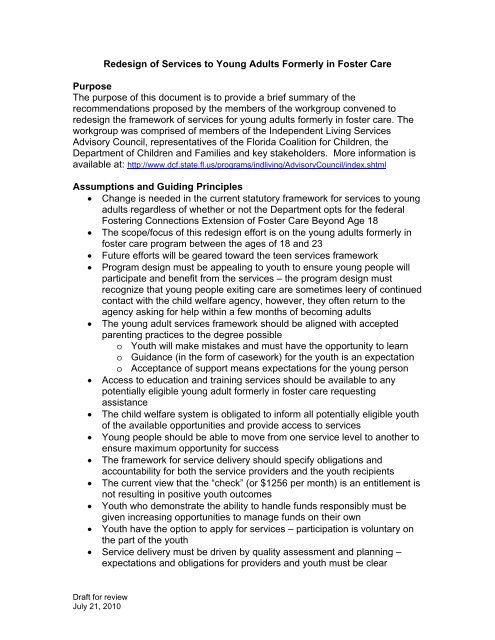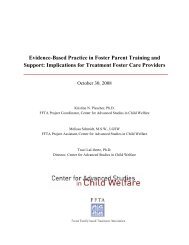Independent Living Program - Florida's Center for Child Welfare
Independent Living Program - Florida's Center for Child Welfare
Independent Living Program - Florida's Center for Child Welfare
- No tags were found...
You also want an ePaper? Increase the reach of your titles
YUMPU automatically turns print PDFs into web optimized ePapers that Google loves.
Redesign of Services to Young Adults Formerly in Foster CarePurposeThe purpose of this document is to provide a brief summary of therecommendations proposed by the members of the workgroup convened toredesign the framework of services <strong>for</strong> young adults <strong>for</strong>merly in foster care. Theworkgroup was comprised of members of the <strong>Independent</strong> <strong>Living</strong> ServicesAdvisory Council, representatives of the Florida Coalition <strong>for</strong> <strong>Child</strong>ren, theDepartment of <strong>Child</strong>ren and Families and key stakeholders. More in<strong>for</strong>mation isavailable at: http://www.dcf.state.fl.us/programs/indliving/AdvisoryCouncil/index.shtmlAssumptions and Guiding Principles Change is needed in the current statutory framework <strong>for</strong> services to youngadults regardless of whether or not the Department opts <strong>for</strong> the federalFostering Connections Extension of Foster Care Beyond Age 18 The scope/focus of this redesign ef<strong>for</strong>t is on the young adults <strong>for</strong>merly infoster care program between the ages of 18 and 23 Future ef<strong>for</strong>ts will be geared toward the teen services framework <strong>Program</strong> design must be appealing to youth to ensure young people willparticipate and benefit from the services – the program design mustrecognize that young people exiting care are sometimes leery of continuedcontact with the child welfare agency, however, they often return to theagency asking <strong>for</strong> help within a few months of becoming adults The young adult services framework should be aligned with acceptedparenting practices to the degree possibleo Youth will make mistakes and must have the opportunity to learno Guidance (in the <strong>for</strong>m of casework) <strong>for</strong> the youth is an expectationo Acceptance of support means expectations <strong>for</strong> the young person Access to education and training services should be available to anypotentially eligible young adult <strong>for</strong>merly in foster care requestingassistance The child welfare system is obligated to in<strong>for</strong>m all potentially eligible youthof the available opportunities and provide access to services Young people should be able to move from one service level to another toensure maximum opportunity <strong>for</strong> success The framework <strong>for</strong> service delivery should specify obligations andaccountability <strong>for</strong> both the service providers and the youth recipients The current view that the “check” (or $1256 per month) is an entitlement isnot resulting in positive youth outcomes Youth who demonstrate the ability to handle funds responsibly must begiven increasing opportunities to manage funds on their own Youth have the option to apply <strong>for</strong> services – participation is voluntary onthe part of the youth Service delivery must be driven by quality assessment and planning –expectations and obligations <strong>for</strong> providers and youth must be clearDraft <strong>for</strong> reviewJuly 21, 2010
















